石化现象成因
- 格式:doc
- 大小:28.00 KB
- 文档页数:6
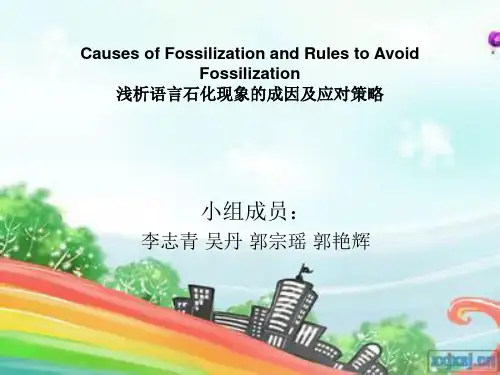
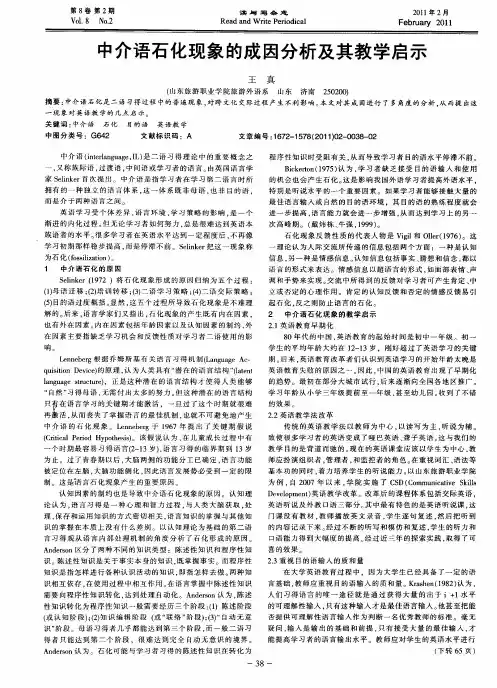
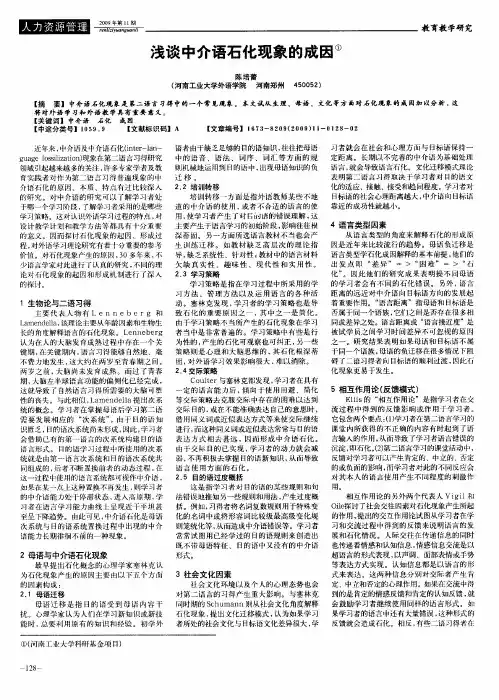
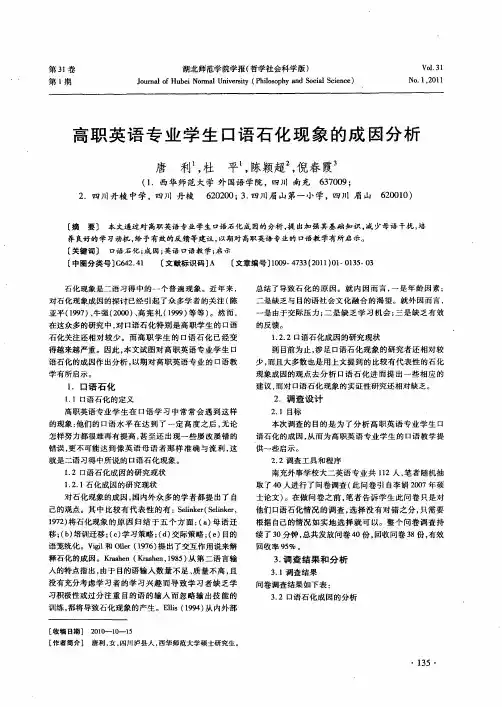
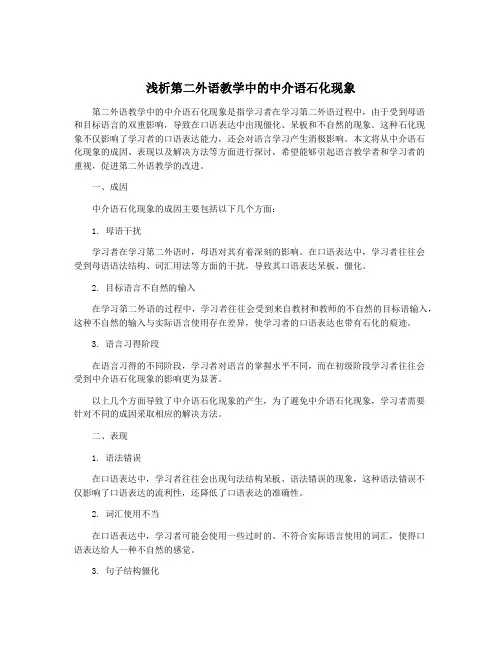
浅析第二外语教学中的中介语石化现象第二外语教学中的中介语石化现象是指学习者在学习第二外语过程中,由于受到母语和目标语言的双重影响,导致在口语表达中出现僵化、呆板和不自然的现象。
这种石化现象不仅影响了学习者的口语表达能力,还会对语言学习产生消极影响。
本文将从中介语石化现象的成因、表现以及解决方法等方面进行探讨,希望能够引起语言教学者和学习者的重视,促进第二外语教学的改进。
一、成因中介语石化现象的成因主要包括以下几个方面:1. 母语干扰学习者在学习第二外语时,母语对其有着深刻的影响。
在口语表达中,学习者往往会受到母语语法结构、词汇用法等方面的干扰,导致其口语表达呆板、僵化。
2. 目标语言不自然的输入在学习第二外语的过程中,学习者往往会受到来自教材和教师的不自然的目标语输入,这种不自然的输入与实际语言使用存在差异,使学习者的口语表达也带有石化的痕迹。
3. 语言习得阶段在语言习得的不同阶段,学习者对语言的掌握水平不同,而在初级阶段学习者往往会受到中介语石化现象的影响更为显著。
以上几个方面导致了中介语石化现象的产生,为了避免中介语石化现象,学习者需要针对不同的成因采取相应的解决方法。
二、表现1. 语法错误在口语表达中,学习者往往会出现句法结构呆板、语法错误的现象,这种语法错误不仅影响了口语表达的流利性,还降低了口语表达的准确性。
2. 词汇使用不当在口语表达中,学习者可能会使用一些过时的、不符合实际语言使用的词汇,使得口语表达给人一种不自然的感觉。
3. 句子结构僵化在口语表达中,学习者往往会使用一些固定的句式和结构,使得表达显得呆板、僵化。
以上几个方面是中介语石化现象的主要表现形式,这些表现不仅影响了学习者的口语表达能力,还可能影响到学习者的语言学习兴趣。
三、解决方法针对中介语石化现象,学习者可以采取以下几种解决方法:1. 提高语言输入的质量通过阅读、听力等方式提高学习者对目标语言的输入,使其接触到更为自然、地道的语言输入,从而有利于减少中介语石化现象的出现。
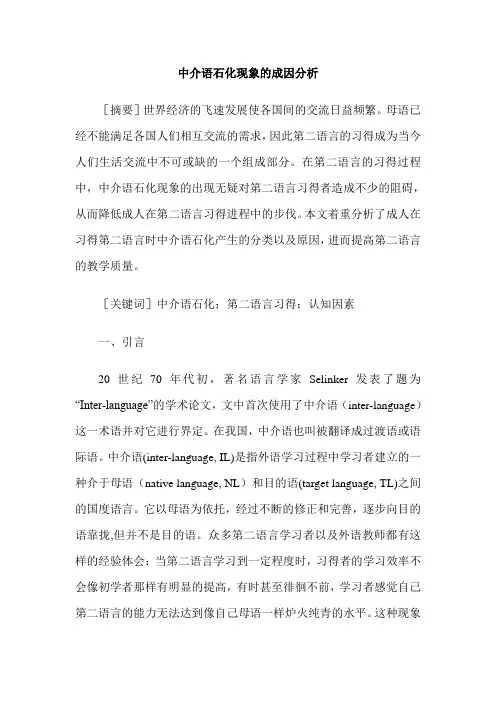
中介语石化现象的成因分析[摘要]世界经济的飞速发展使各国间的交流日益频繁。
母语已经不能满足各国人们相互交流的需求,因此第二语言的习得成为当今人们生活交流中不可或缺的一个组成部分。
在第二语言的习得过程中,中介语石化现象的出现无疑对第二语言习得者造成不少的阻碍,从而降低成人在第二语言习得进程中的步伐。
本文着重分析了成人在习得第二语言时中介语石化产生的分类以及原因,进而提高第二语言的教学质量。
[关键词]中介语石化;第二语言习得;认知因素一、引言20世纪70年代初,著名语言学家Selinker发表了题为“Inter-language”的学术论文,文中首次使用了中介语(inter-language)这一术语并对它进行界定。
在我国,中介语也叫被翻译成过渡语或语际语。
中介语(inter-language, IL)是指外语学习过程中学习者建立的一种介于母语(native language, NL)和目的语(target language, TL)之间的国度语言。
它以母语为依托,经过不断的修正和完善,逐步向目的语靠拢,但并不是目的语。
众多第二语言学习者以及外语教师都有这样的经验体会:当第二语言学习到一定程度时,习得者的学习效率不会像初学者那样有明显的提高,有时甚至徘徊不前,学习者感觉自己第二语言的能力无法达到像自己母语一样炉火纯青的水平。
这种现象就是本文所要讨论的中介语石化现象(fossilization)。
二、中介语石化现象的分类Selinker从两个不同的方面对石化现象进行了分类。
一方面,他根据石化主体的不同将其分为个人石化(individual fossilization)和群体石化(group fossilization)。
个体石化的现象大致表现在两个方面:(1)错误石化(error reappearance),这种现象表现为第二语言习得者在学习的某些方面被纠正多次,并且在语言使用中重复出现自己已经认识到的错误;(2)语言能力石化(language competence fossilization),即过渡语在第二语言的语音发音、第二语言的句法结构运用以及第二语言的词汇使用方面的石化现象。
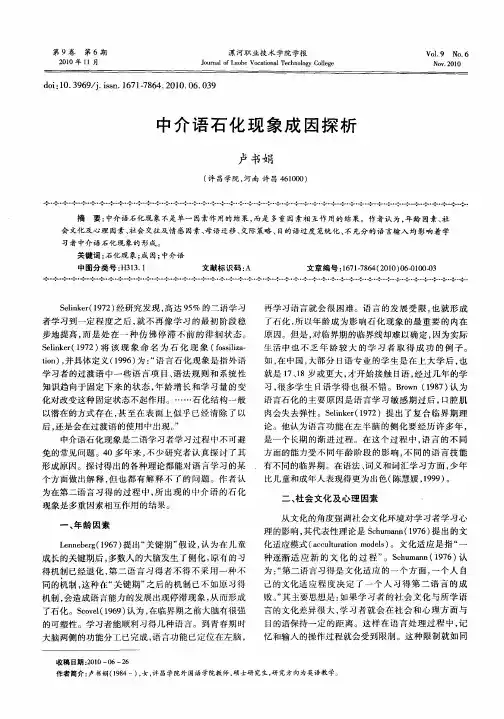
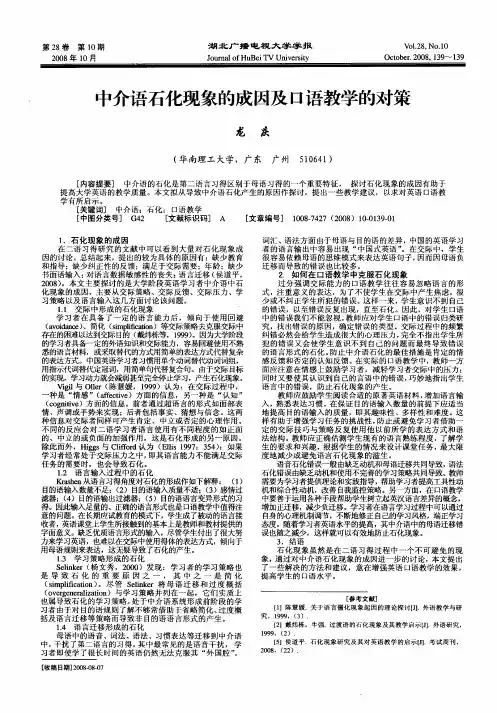
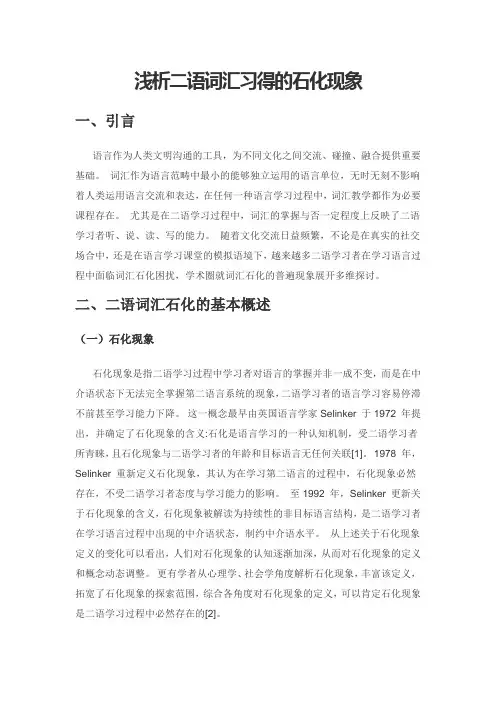
浅析二语词汇习得的石化现象一、引言语言作为人类文明沟通的工具,为不同文化之间交流、碰撞、融合提供重要基础。
词汇作为语言范畴中最小的能够独立运用的语言单位,无时无刻不影响着人类运用语言交流和表达,在任何一种语言学习过程中,词汇教学都作为必要课程存在。
尤其是在二语学习过程中,词汇的掌握与否一定程度上反映了二语学习者听、说、读、写的能力。
随着文化交流日益频繁,不论是在真实的社交场合中,还是在语言学习课堂的模拟语境下,越来越多二语学习者在学习语言过程中面临词汇石化困扰,学术圈就词汇石化的普遍现象展开多维探讨。
二、二语词汇石化的基本概述(一)石化现象石化现象是指二语学习过程中学习者对语言的掌握并非一成不变,而是在中介语状态下无法完全掌握第二语言系统的现象,二语学习者的语言学习容易停滞不前甚至学习能力下降。
这一概念最早由英国语言学家Selinker 于1972 年提出,并确定了石化现象的含义:石化是语言学习的一种认知机制,受二语学习者所青睐,且石化现象与二语学习者的年龄和目标语言无任何关联[1]。
1978 年,Selinker 重新定义石化现象,其认为在学习第二语言的过程中,石化现象必然存在,不受二语学习者态度与学习能力的影响。
至1992 年,Selinker 更新关于石化现象的含义,石化现象被解读为持续性的非目标语言结构,是二语学习者在学习语言过程中出现的中介语状态,制约中介语水平。
从上述关于石化现象定义的变化可以看出,人们对石化现象的认知逐渐加深,从而对石化现象的定义和概念动态调整。
更有学者从心理学、社会学角度解析石化现象,丰富该定义,拓宽了石化现象的探索范围,综合各角度对石化现象的定义,可以肯定石化现象是二语学习过程中必然存在的[2]。
(二)二语词汇石化的表现中介语石化现象被提出后,学界又对词汇石化现象进行深入研究,主要可分为对词汇习得量石化、词汇语义及词汇运用石化的研究。
词汇习得量是指在学习第二语言过程中,学习者的词汇量积累到一定程度而出现停滞不前的现象,即词汇习得量石化。
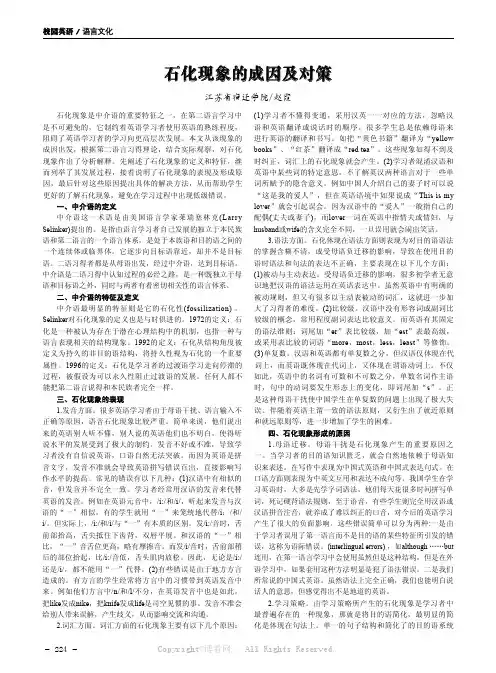
- 224 -校园英语 /石化现象的成因及对策江苏省宿迁学院/赵霞石化现象是中介语的重要特征之一,在第二语言学习中是不可避免的,它制约着英语学习者使用英语的熟练程度,阻碍了英语学习者的学习向更高层次发展。
本文从该现象的成因出发,根据第二语言习得理论,结合实际观察,对石化现象作出了分析解释。
先阐述了石化现象的定义和特征,继而列举了其发展过程,接着说明了石化现象的表现及形成原因,最后针对这些原因提出具体的解决方法,从而帮助学生更好的了解石化现象,避免在学习过程中出现低级错误。
一、中介语的定义中介语这一术语是由美国语言学家莱瑞塞林克(Larry Selinker)提出的。
是指由语言学习者自己发展的独立于本民族语和第二语言的一个语言体系,是处于本族语和目的语之间的一个连续体或临界体。
它逐步向目标语靠近,却并不是目标语。
二语习得者都是从母语出发,经过中介语,达到目标语。
中介语是二语习得中认知过程的必经之路,是一种既独立于母语和目标语之外,同时与两者有着密切相关性的语言体系。
二、中介语的特征及定义中介语最明显的特征则是它的石化性(fossilization) 。
Selinker 对石化现象的定义也是与时俱进的。
1972的定义:石化是一种被认为存在于潜在心理结构中的机制,也指一种与语言表现相关的结构现象。
1992的定义:石化从结构角度被定义为持久的非目的语结构,将持久性视为石化的一个重要属性。
1996的定义:石化是学习者的过渡语学习走向停滞的过程,被假设为可以永久性阻止过渡语的发展。
任何人都不能把第二语言说得和本民族者完全一样。
三、石化现象的表现1.发音方面。
很多英语学习者由于母语干扰、语言输入不正确等原因,语音石化现象比较严重。
简单来说,他们说出来的英语别人听不懂,别人说的英语他们也不明白,使得听说水平的发展受到了极大的制约。
发音不好或不准,导致学习者没有自信说英语,口语自然无法突破。
而因为英语是拼音文字,发音不准就会导致英语拼写错误百出,直接影响写作水平的提高。
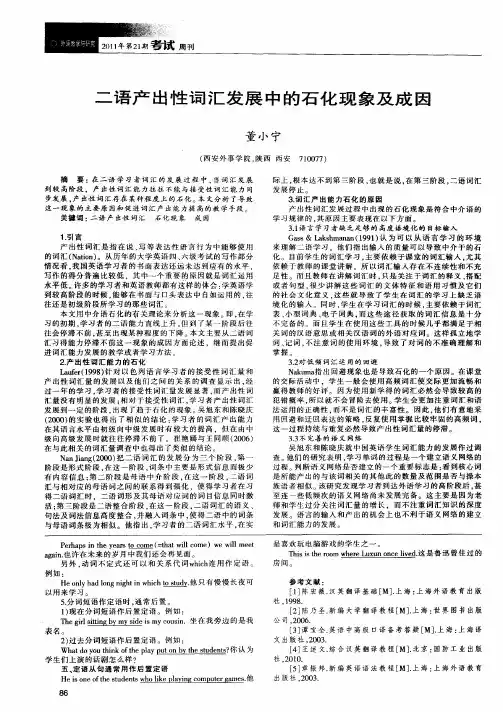
石头也会生长了解奇妙的石化过程当我们谈论生长的时候,往往会想到植物和动物。
但你可能没有想过,石头也可以生长。
这种奇妙的现象被称为石化,是一种矿物质长时间积累在石头上的过程。
在这篇文章中,我们将深入探讨石化过程。
石化是一种缓慢而长久的过程,需要数百年甚至上千年的时间才能形成。
它发生在一些特定的岩石类型中,如石灰岩和石膏岩。
这些岩石富含溶解性的矿物质,当它们与地下水中的化学物质相互作用时,就会发生石化现象。
石化过程的第一步是岩石溶解。
当地下水中的酸性或碱性物质接触到岩石表面时,会导致岩石中的矿物质溶解。
这种溶解作用是非常缓慢的,但随着时间的推移,矿物质会逐渐溶解并渗透到岩石中。
一旦矿物质渗透到岩石中,它们会与岩石中的其他元素结合,形成新的物质。
这个过程被称为沉积或沉淀作用。
当岩石中的矿物质达到饱和点时,新的沉积物会开始在岩石表面形成。
在新的沉积物形成的同时,一些岩石中的矿物质可能会重新结晶。
这种重新结晶是石化过程的关键步骤之一。
岩石中的矿物质在高温和高压的条件下重新排列组合,形成带有晶体结构的新岩石。
随着时间的推移,新岩石中的矿物质会不断增加,原始岩石逐渐被替代。
这个过程被称为重结晶,它使岩石中原本的纹理和结构消失,变得坚硬而均匀。
石化过程中产生的新岩石可以呈现出各种各样的形态。
有些石头可能呈现出丝状、块状或层状的结构。
这些结构是由于沉积物和矿物质在岩石中的不同分布而形成的。
石化现象也会导致一些特殊的地质奇观的形成,如喀斯特地貌和石林。
喀斯特地貌是由于石化过程中石灰岩的溶解和侵蚀而形成的。
石林则是由于石化过程中石膏岩的溶解和沉积而形成的。
石化过程不仅仅是地质学的研究对象,它也对我们的生活产生了一定的影响。
石化过程中形成的矿物质可以用来制造建筑材料、工艺品和宝石等。
石灰岩、大理石和花岗岩等石材就是石化过程的产物。
石化也在一定程度上帮助保护了一些珍贵的古生物化石。
当动物或植物的遗骸被埋在岩石层中时,它们会与岩石中的矿物质相互作用。
语言石化现象的成因和改善策略的探讨目录摘要 (1)Abstract (1)关键词 (1)Key words (1)1.语言石化现象的认识 (1)2.语言石化现象的分类 (2)2.1石化现象形式上的分类 (3)2.1.1个体石化 (3)2.1.2群体石化 (3)2.2石化现象的性质分类 (3)3.石化现象产生的原因 (3)3.1 Lamendella的生物论 (3)3.2相互作用论 (5)3.3石化形成中的两个“策略”......... ............................................. (6)3.3.1 学习策略 (7)3.3.2 交际策略 (7)3.4大学生英语学习中的石化现象 (7)3.4.1 学习者的情感因素 (7)3.4.2 兴趣的减少 (7)4.石化现象改善的策略 (8)4.1目标语知识的积累 (8)4.2降低母语的干扰 (9)4.3情感的反馈 (9)4.4教师教学方式的转变 (9)总结 (10)致谢 (10)参考文献 (11)摘要:中介语石化现象是外语学习过程中普遍存在且不可避免的一种现象,是多年来困扰我国外语学习者的一个难点,表现为外语学习达到一定程度后就趋向于停留在固定状态。
本文浅论了石化的定义,归纳了几种有关石化的成因,对缓解石化提出几点建议,使学习者最大程度的延缓和避免石化现象的产生,同时对研究前景予以展望。
Abstract:Interlanguage fossilization is a pervasive and inevitable phenomenon in foreign language learning,it has been a universal problem for learner, tending to keep in a Interlanguage relative to Target language. This paper defines the natural fossilization,analyzes and generalizes some reasons of fossilization, and put forward some measures and suggestions which may be helpful for learners, in order to make learners avoid fossilization in Interlanguage to maximum extent and meanwhile a perspective of its future is given.关键词:二语学习;石化现象学习者;情感;思维Key words: second language learning; fossilization phenomenon; learner; emotion; mind1 语言石化现象的认识二语学习者在一定年龄期,一定目标语知识的获得后,常常会经历一个类似“关口”的阶段。
中介语石化现象成因多维度分析及其英语教学启示中介语石化是国内学生学习英语过程中的一个重要的语言现象,引起了学者和教师的广泛关注。
在介绍中介语石化现象的定义、特征及分类的基础上,从不同角度具体探究了中介语石化现象的成因。
通过对中介语石化现象多角度的分析,作者总结出一些英语教学启示,教师可以用来减少石化现象对学生英语学习的影响,提高学生英语学习效率。
标签:中介语;石化;成因;教学启示引言中介语是第二语言习得研究中一个重要的概念和课题,最早由英国语言学家Larry Selinker在1969年的剑桥国际会议上提出。
1972年,在《中介语》一文中,Selinker正式提出了中介语,并对其进行了明确的界定。
从此,中介语在世界范围内被接受,并得到广泛研究与应用,确定了其在第二语言习得理论中的重要地位。
实际上,在Selinker之前,也有其他语言学家提出过类似的概念。
比如Nemster 在1971年提出的“接近系统”,Corder提出的“特异方言”。
但最终被大家广为认可和接受的是Selinker的中介语。
中介语具有三大主要特征:系统性、渗透性、石化现象。
其中,对于中介语石化特征的研究比较多。
了解中介语石化现象有利于英语教师在教学过程中帮助学生更好地克服其带来的负面影响。
一、中介语石化现象1. 石化现象的定义通过对大量第二语言学习者的研究,Selinker发现,95%学习者的第二语言达到一定阶段后就会停滞不前甚至回退,只有大约5%的学习者可以和该语言的母语者一样,不断地推进目的语的学习,最终达到与母语者同等的水平。
这种停滞不前,第二语言学习者不能获得母语者那样的语言能力的现象就是石化现象。
最初,Selinker(1972)对石化现象给出了如下定义:“石化就是母语的词条、规则和词系统倾向保留在与目的语相关的中介语中,不管学习者的年龄有多大,也不管学习者接受的解释和指导有多少,这种倾向都不会改变。
”1992年,Selinker 对于石化现象做出了更新的解释,他指出:“语言的石化现象是指外语学习者的中介语的一些语言项目,语法规则和系统性知识趋向于固定下来的状态,年龄的增长和学习量的变化对改变这种固定状态不起作用。
石化现象的成因摘要:当今石化现象已经引起了许多应用语言方面的研究者的关注,本文把石化现象分为有意识和无意识石化现象两种,与赛林格提出的石化现象的条目,规则和子系统不同。
本文详细的论述了导致石化现象的原因,并提出高校教师应该了解其成因并想方设法提高学生学习英语的自信,兴趣和动机。
关键词:成因;自信;兴趣;动机abstract:nowadays, fossilization has been paid much attention to by many researchers in the field of applied linguistics; this paper classifies fossilization into voluntary fossilization and involuntary fossilization, which are different from selinker’s fossilization forms of fossilized items, rules and subsystems. in this paper, the author analyses the causes of the phenomenon of fossilization in detail and comes to a conclusion that college teachers should understand the causes of the phenomenon of fossilization and try all possible means to enhance the students’ confidence, interest and motivation.key words: causes,confidence, interest, motivationthe causes of the phenomenon of fossilizationⅰintroductionin the process of learning a foreign language, the languagethat the learners use is neither their mother language nor the target language. it is called interlanguage by selinker which starts with the mother language and is approaching to the target language. in the academic field of china, scholars and experts have shown enough attention and made some researches about the relevant topic of fossilization of vocabulary, writing, oral english, listening and so on, but there are not many breakthroughs.ⅱthe varieties and classifications of fossilizationfrom an ea (error analysis) perspective, the learner is no longer seen to be a passive recipient of second language input, but rather plays an active role, processing input, generating hypotheses, testing them and refining them, all of which determine the ultimate second language level of proficiency he will reach. it is generally accepted now that both innate and environmental conditions must be met for language to be acquired. mentalists have given us reasons to believe in the necessity of the innate universal grammar. their theories emphasize the importance of the learner’s “black box”, an innate mechanism. behaviorists have not denied the innate ability its importance in language acquisition. as chomsky argues, even “pure”learning theories of behaviorism assumean innate ability to make associations between stimulus and response. recently, some new theories called interactionist theories come out. they consider language acquisition a product of the complex interaction of the linguistic environment and the learner’s internal mechanism. the validity of these theories has been well proved in second language acquisition.ⅲ the causes of the phenomenon of fossilization1. fossilization out of learner’s inappropriate learning methodif the second language learners choose the wrong or inappropriate method of learning a foreign language, this will possibly lead to the phenomenon of fossilization. for example, when the second language learners are reading a foreign article, they have already formed a habit of concerning too much about the vocabulary and the habit of translating every single sentence into the mother tongue, which does not only do little good to their reading speed, but also do harm to the transformation of their way of thinking. if the learners want to practice their oral english by using some inappropriate phonetic materials to imitate, they presuppose that the more they imitate the material, the bettertheir oral english will be. actually, the more they practice by using the wrong material, the more likely the phenomenon of fossilization will appear.2. fossilization out of the learner’s inappropriate habit of communicationif the learners have formed an inappropriate habit of english communication, it will also cause the phenomenon of fossilization. if the english learners have learned english for a long period, the learners would like tend to use a simplified sentence patterns and phrases to communicate in their daily life, most of which are proved to be wrong according to the english grammar. the reason why the learners are using this simplified forms is that they are easy to use and remember; most importantly, they will not affect their communication to a large extent. therefore, after a long time of using this kind of simplified form, the phenomenon of fossilization will appear.3. fossilization out of learner’s emotional factors among all the emotional factors that may most positively influence the learner’s learning is the motivation. some of the english learners learn english for some practical reasons,such as college entrance examination, cet4 or cet6. after they have passed the exams for a period of time, the fossilization will appear. another reason of the fossilization is that the learners are lack of interest, because they have a very poor basic knowledge about english, so there has to be a lot of barriers and difficulties ahead of them. therefore, they will not easily improve their english in a short time, eventually the fossilization will appear.ⅳconclusionit is well known that fossilization is a relatively complicated process; it can not be predicated and eradicated. as college teachers, they should consciously strengthen the authentic linguistic input in classroom teaching, and should know how to correctly handle the mistakes made by students. students’interest and motivation should be greatly enhanced by teachers, and their chinese way of thinking should be changed. in a word, both teachers and students should understand the causes of the phenomenon of fossilization, and they should use some positive ways to make learning english easier and happier.references[1]rod ellis, the study of second language acquisition [m]上海外语教育出版社.1999.[2]s. p. corder, error analysis and interlanguage [m] 1982.[3]姜瑾、施华珍,中国学生英语学习过程中”石化现象”2000.[4]牛强,过渡语的石化现象及其教学启示。